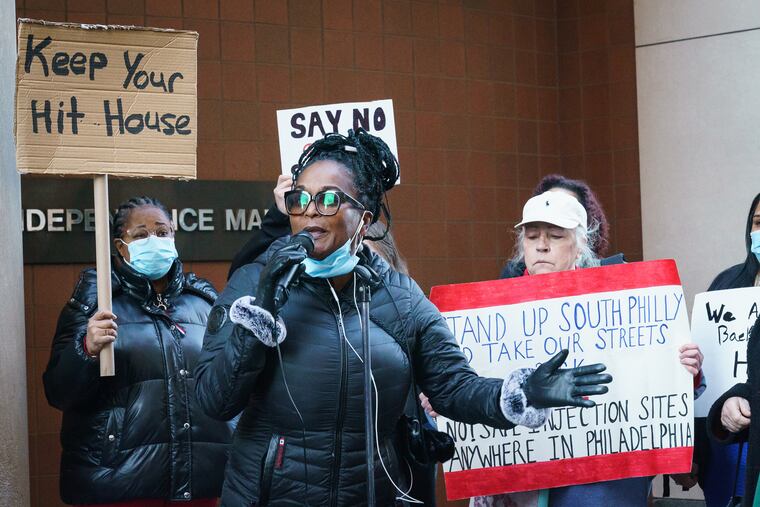Philly neighborhood activists met with Justice Dept. over supervised drug sites. Elected officials were turned away.
Residents from Philadelphia neighborhoods that could host a site have long asked that they be more involved in discussions about the idea.

Representatives from neighborhood groups around Philadelphia said they felt federal officials are not listening to their concerns about efforts to open a place in the city where people could inject drugs under medical supervision.
Civic group leaders met Tuesday with U.S. Attorney Jacqueline Romero as the U.S. Justice Department conducts settlement talks with Safehouse, the nonprofit attempting to open the site. They tried to bring elected officials to the meeting, but said the politicians were turned away.
The federal government sued Safehouse over the site’s opening in 2019. After years of legal fighting, the organization started mediated talks with Department of Justice officials in January, aiming to settle in the case.
» READ MORE: New York’s supervised injection sites have halted nearly 700 overdoses in just over a year
But residents from Philadelphia neighborhoods where a site may end up want to be more involved in discussions.
Shannon Farrell, who runs the Harrowgate Civic Association, said that her group and others in the city began asking for a meeting with Romero about two months ago, and had sent Romero’s office a list of people who would attend, including elected officials.
On Tuesday, those officials were not permitted into the meeting, which was not open to the public, Farrell said, explaining that Department of Justice officials said the elected officials did not have clearance to attend. (Typically, the department’s Washington-based Office of Legislative Affairs coordinates requests and visits from members of Congress, according to its website.)
“I think that disenfranchises thousands of people that we represent who are against supervised injection sites,” said State Rep. Jose Giral, a Democrat who represents parts of Kensington.
Romero’s office declined comment.
‘It feels like the decision has already been made’
Ronda Goldfein, Safehouse’s vice president, said she wasn’t aware of a meeting between Romero and the civic associations. Only the parties involved in the suit — the nonprofit and the federal government — are involved in the ongoing settlement talks, she said. Her organization remains open to conversations with the community.
“We always want to hear what people are thinking,” she said. “These talks are about getting the authority to implement this kind of initiative. Then there has to be a conversation about how the initiative is implemented.”
Still, community members said they had been left out of conversations.
“It feels like decisions are being made with no consideration of what the community wants or needs. It feels as though the decision has already been made,” said Sonja Bingham, the president of Friends of Harrowgate Park.
Bingham said she believes that supervised consumption sites “cater to illicit activity” and that programs in the neighborhood that offer outreach to people with addiction serve to attract dealers and drug use.
“I just live here,” she said. “I should not have to have skin in the game of whether someone recovers. I should not have to be concerned with someone else’s problems.”
Farrell said that neighbors in the meeting were disappointed that elected officials weren’t allowed in, and asked Romero to “uphold the law,” referring to a prior court ruling in the Safehouse case that deemed unlawful a place where people inject drugs under supervision.
‘It’s our responsibility to listen to what residents want’
In 2019, then-U.S. Attorney Bill McSwain sued Safehouse, arguing that opening a supervised consumption site would violate a federal law prohibiting the establishment of a location for the use of drugs. A federal judge disagreed, accepting Safehouse’s argument that its purpose is to save lives. But an appeals court eventually struck down the decision.
Safehouse filed a countersuit, asking the government to rule on several claims not addressed in the original rulings, including that Safehouse officials have a religious right to save lives amid an overdose crisis that killed 1,276 Philadelphians in 2021. The most recent settlement talks stem from that suit.
» READ MORE: Philly’s supervised injection site nonprofit will again start settlement talks with the feds
Councilmember Quetcy Lozada, who represents part of Kensington, said supervised consumption sites might be necessary to curb Philadelphia’s overdose crisis, one of the deadliest in the country. (Two sites opened in 2021 in New York, the only two officially sanctioned sites in the country.)
But local officials must also weigh neighborhood concerns, she said.
“It’s our responsibility to listen to what residents want, and Kensington and Harrowgate are against a supervised injection site [in their Council district]. Nor should they be in any location where community members are raising families, or along a commercial corridor,” she said.